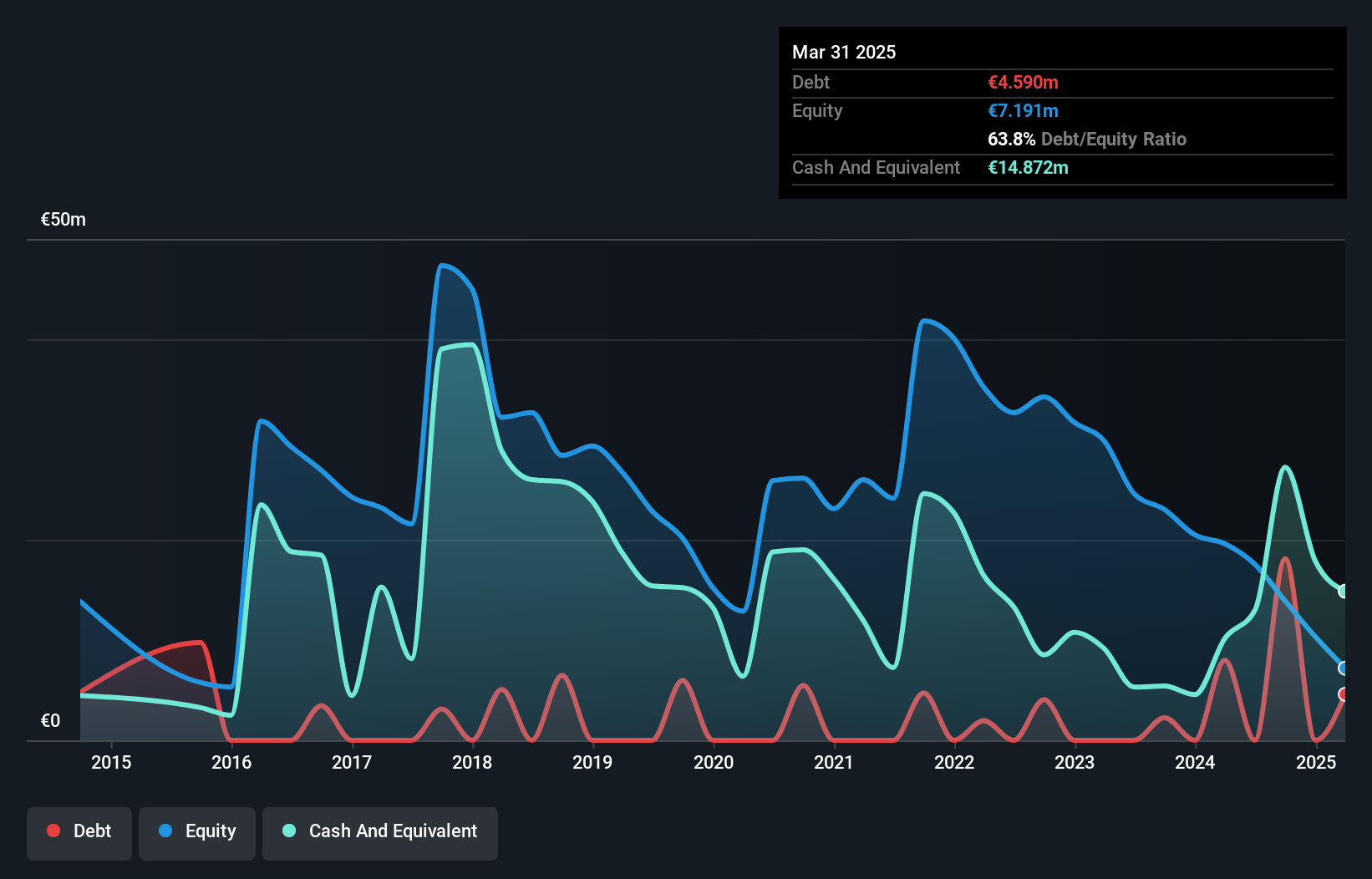Legendary fund manager Li Lu (who Charlie Munger backed) once said, 'The biggest investment risk is not the volatility of prices, but whether you will suffer a permanent loss of capital.' It's only natural to consider a company's balance sheet when you examine how risky it is, since debt is often involved when a business collapses. We can see that BRAIN Biotech AG (ETR:BNN) does use debt in its business. But the real question is whether this debt is making the company risky.
When Is Debt Dangerous?
Debt and other liabilities become risky for a business when it cannot easily fulfill those obligations, either with free cash flow or by raising capital at an attractive price. Part and parcel of capitalism is the process of 'creative destruction' where failed businesses are mercilessly liquidated by their bankers. However, a more usual (but still expensive) situation is where a company must dilute shareholders at a cheap share price simply to get debt under control. Of course, the upside of debt is that it often represents cheap capital, especially when it replaces dilution in a company with the ability to reinvest at high rates of return. When we examine debt levels, we first consider both cash and debt levels, together.
What Is BRAIN Biotech's Net Debt?
You can click the graphic below for the historical numbers, but it shows that BRAIN Biotech had €4.59m of debt in March 2025, down from €7.97m, one year before. But it also has €14.9m in cash to offset that, meaning it has €10.3m net cash.

How Healthy Is BRAIN Biotech's Balance Sheet?
Zooming in on the latest balance sheet data, we can see that BRAIN Biotech had liabilities of €18.9m due within 12 months and liabilities of €53.0m due beyond that. Offsetting this, it had €14.9m in cash and €8.10m in receivables that were due within 12 months. So its liabilities outweigh the sum of its cash and (near-term) receivables by €48.9m.
When you consider that this deficiency exceeds the company's €48.1m market capitalization, you might well be inclined to review the balance sheet intently. In the scenario where the company had to clean up its balance sheet quickly, it seems likely shareholders would suffer extensive dilution. Given that BRAIN Biotech has more cash than debt, we're pretty confident it can handle its debt, despite the fact that it has a lot of liabilities in total. The balance sheet is clearly the area to focus on when you are analysing debt. But ultimately the future profitability of the business will decide if BRAIN Biotech can strengthen its balance sheet over time. So if you're focused on the future you can check out this free report showing analyst profit forecasts.
Check out our latest analysis for BRAIN Biotech
Over 12 months, BRAIN Biotech made a loss at the EBIT level, and saw its revenue drop to €54m, which is a fall of 4.9%. We would much prefer see growth.
So How Risky Is BRAIN Biotech?
We have no doubt that loss making companies are, in general, riskier than profitable ones. And in the last year BRAIN Biotech had an earnings before interest and tax (EBIT) loss, truth be told. And over the same period it saw negative free cash outflow of €6.9m and booked a €14m accounting loss. But at least it has €10.3m on the balance sheet to spend on growth, near-term. Overall, we'd say the stock is a bit risky, and we're usually very cautious until we see positive free cash flow. When analysing debt levels, the balance sheet is the obvious place to start. But ultimately, every company can contain risks that exist outside of the balance sheet. Case in point: We've spotted 2 warning signs for BRAIN Biotech you should be aware of.
At the end of the day, it's often better to focus on companies that are free from net debt. You can access our special list of such companies (all with a track record of profit growth). It's free.
Valuation is complex, but we're here to simplify it.
Discover if BRAIN Biotech might be undervalued or overvalued with our detailed analysis, featuring fair value estimates, potential risks, dividends, insider trades, and its financial condition.
Access Free AnalysisHave feedback on this article? Concerned about the content? Get in touch with us directly. Alternatively, email editorial-team (at) simplywallst.com.
This article by Simply Wall St is general in nature. We provide commentary based on historical data and analyst forecasts only using an unbiased methodology and our articles are not intended to be financial advice. It does not constitute a recommendation to buy or sell any stock, and does not take account of your objectives, or your financial situation. We aim to bring you long-term focused analysis driven by fundamental data. Note that our analysis may not factor in the latest price-sensitive company announcements or qualitative material. Simply Wall St has no position in any stocks mentioned.
About XTRA:BNN
BRAIN Biotech
Provides bio-based products and solutions in Germany, the United States, France, the Netherlands, and the United Kingdom.
Excellent balance sheet with reasonable growth potential.
Market Insights
Community Narratives



